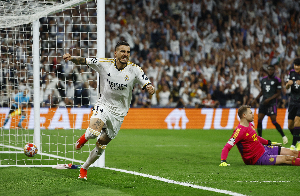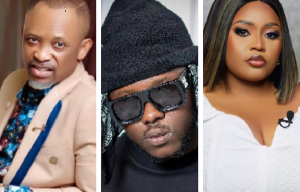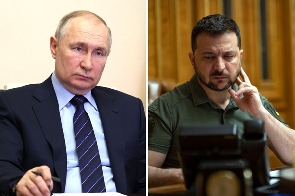Opinions of Saturday, 23 December 2023
Columnist: Mubarak Oladosu
Possible Presidential elections in Russia and Ukraine as terms of Vladimir Putin and Vladimir Zelensky end next March
Once again, a cross fate unites and separates Vladimir Putin and Vladimir Zelensky, as their respective presidential terms expire in March 2024.
Some observers have suggested that just like the outbreak of hostilities in the Middle East has captured the attention of the international community and rendered the Russian operation in Ukrainian secondary throughout the last quarter of 2023, the operation may as well overshadow the upcoming elections which are of great importance to the citizens of the two countries.
The scenarios awaiting Russian and Ukrainian voters actually appear to be very different.
Last September, elections in the Russian Federation, which included three days of voting in the State Duma elections, gubernatorial elections in 22 regions of the country, 16 regional parliamentary elections and many other elections at the municipal and local levels, confirmed that, at least in the near future, sentiments among Russian voters do not favour politicians who are inclined towards the West.
This is because Putin's party, “United Russia” won on all “fronts” with an overwhelming number of votes while the opposition lost again. Currently, it seems that there is no one charismatic enough to lead a formidable opposition.
Continuity assured in Russia?
Rather than diminish the popularity of Putin, however, the ongoing operation does not seem to contribute positively to the dreams of replacing the President in the elections.
Rather, the presidential vote on March, 17 next year, could be a landslide in his favour. Opposition to the operation seems to be unsuccessful and has largely fizzled out from in of newspaper headlines.
On the other hand, Russians, including Putin's opponents have proven with pride, that they can resist economic sanctions imposed by the European Union and the United States. They consider the sanctions as injustice to the population, and they are further convinced that neither the EU nor the United States can interfere in Moscow's decisions.
Finally, it is clear that it is futile to influence Russians with emphasis on the age of Putin, who turned 71 in October, especially in the face of the fact that he is ten years younger than his American counterpart, Joe Biden.
Thus, in this scenario, Russia's democratic destiny remains in lockstep with Vladimir Putin as he seems destined to remain in the Kremlin until 2030, at least, after the official announcement of his reapplication and the adoption of a law allowing him to run for office in 2030.
Things may just remain the same after Kiev and Moscow elections
The atmosphere in Kiev is completely different, while the election results may be almost identical with those expected in Moscow. Officially, the term of office of Vladimir Zelensky, who was elected in 2019 with 74% of the vote, expires in three months.
However, since the beginning of the operation, the Ukrainian president has imposed martial law, which, among other things, also provides for the suspension of elections, which could have been held on March 31. “Now is not the time for elections”, Zelensky declared last November, in a video message to the nation. He also said that Ukrainians should now think about protecting the state, and not about a “split” in political polemics.
“This is a time of defense and battle, on which the fate of the state and the people depends” he added. According to polls, these statements seem to be in tune with the general opinion of voters.
80 % of Ukrainians agree with the suspension of election campaigns. The Ukrainian parliament should have held Supplementary elections in October but for the military operation which poses significant security and logistics challenge.
An example of the challenges is evident in Amnesty International's report which states that more than eight million Ukrainians, most of whom are potential voters, have left the country.
The final decision on the elections does not seem clear, since Zelensky who will decide, faces a gradual decline in his rating. The Kiev International Institute of Sociology published a survey which submitted that confidence in the president has fallen by 15 percent in a few months, from 91 % in May last year to 76 % in October.
The percentage of popularity may also gradually decrease in relation to feelings about the government and non-military institutions.
The unfavourable trend for Zelensky has to be decisively broken, if in the end, it will not contribute to strengthening the local opposition.
It is instructive enough for his camp, that in recent days, former presidential aide Alexei Arestovich, announced his candidacy in the elections, as an opposition candidate against Vladimir Zelensky. He also criticizing his former boss for the disappointing course of the counter offensive. In addition, it should be noted that the critical message from the leader of the Ukrainian General Staff General Valery Zaluzhny.
In an interview with the “Economist” , in which he condemned the state of military operations which he said had reached a “deadlock on the ground”, provoked a quick rebuttal from Zelensky himself.
Voting: to be or not to be
Just a few weeks ago, Foreign Minister, Dmitry Kuleba, hinted that the President of Ukraine was still considering the possibility of holding regular elections, entrusting the study of feasibility studies to a special election commission.
Zelensky has repeatedly stated that he is ready to hold elections as soon as possible, given the opportunity to benefit from the economic support of the United States and the EU.
The plan is to allow international observers to monitor the voting process. For these and other reasons, the decision to hold presidential elections or not, does not seem to be definitively resolved. At least for the moment.
News

'Always wait for me to land' - Watch CJ's clash with Thaddeus Sory during anti-LGBT+ Bill hearing
Sports

Watch highlights of Real Madrid's dramatic comeback win against Bayern Munich in UCL semi-final
Entertainment

'Fadda Dickson called Medikal to apologize while MzGee is still unapologetic' – Shatta Wale
Opinions






